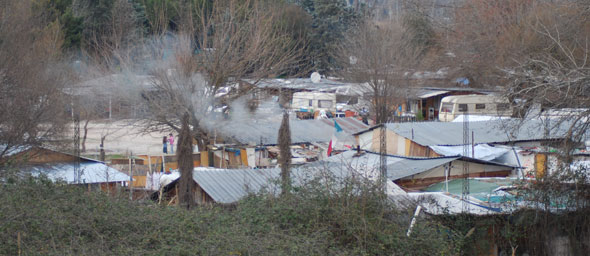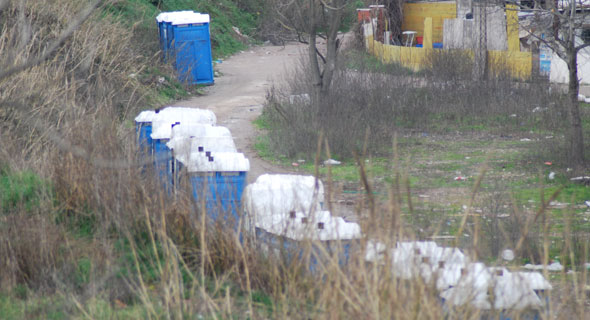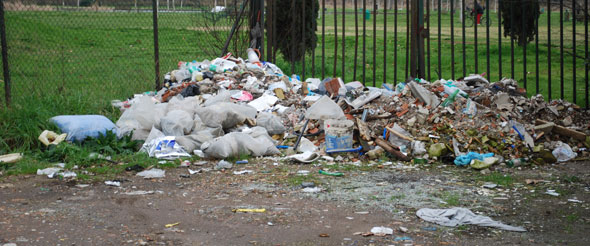
Having been shocked by the horrible living conditions of the Roma in the Italian capital while jogging earlier this week I today returned to the area, camera in hand. There were no police or military present this time.
It’s far from easy to take photos when people are looking at you from all sides and wondering who the guy is with the zoom lens and the black satchel. Plus knowing the tensions between the Roma population and the ‘establishment’ I cannot have known what reactions my presence would have provoked. Still I managed a few shots that convey the depravation of the camp.
Rather that surreptitiously take photos I decided to walk right up to the camp and try to talk to someone to gain a further insight into what had happened here earlier in the week. I approached an elderly chap and asked in my limited Italian why the military had been present earlier in the week.
‘Perché?’ He replied with a shrug, not wishing to divulge any information. The mention of the ‘militari’ drew an interesting reaction from the small boy beside the old gentleman, hands to his face and eyes darting with nerves. I tried to ask whether such military action was normal as in the UK I had never seen anything like it; this too provoked a shrug.
By this time I had drawn the attention of the whole family, bringing the women away from a rough pan of minced meat being prepared beside an old stove outside the metal shack. Feeling I better not pry any more I said goodbye and thank you to the old guy, shook his hand and drew a toothless smile. I’m not sure what he and his family made of this meeting with a stranger who spoke little Italian but at least showed them some respect.
I walked back towards my hotel with a sadness in my heart. How in 2009 in the European Union can people live like this? No sanitation, make-shift metal shacks surrounded by puddles and mud?
For some added irony the wall of the bridge on the main road close to the camp was plastered with posters with a baby with a crown with the slogan “Roma Capitale della Vita” (Rome Capital of Life) put up by a group on the right of Italian politics, and for Di Pietro’s “Italia dei Valori” party. CGIL’s “Italiano / Straniero” campaign posters adorned a derelict building a little further – does it apply to Roma too? Beside the CGIL posters a dead moped is propped up in front of billboards for Berlusconi’s party stating how the local police had been armed.
What do the Roma feel when walking past all of this on their way back to their deprived corner by the Tiber? What do the middle class parents in their Fiats think when dropping their children off at the Circolo Sportivo RAI (the sport centre of the state TV) just a matter of metres from shocking poverty?
I don’t know what the solutions are for all of this, but in most of Europe there would be an outcry if prisoners were kept in surroundings like this – where are the people helping out and caring here?














I just wanted to create what we call “contraddittorio”.
Since everyone has the freedom to say what he think, I thought that the first post needed somewhat in reply..
I just actually dislike opinions that easily fall into stereotypes…expecially if they come from people I suppose to be “better informed” or with a higher level of knowledge.
Said that, as I mentioned in the first post, I accept every kind of criticism about Italy and Roma or whatelse, as long as they are clever, based on facts, able to develop a positive changing!
Hope to read new opinions over that issue…
G.
Giovanni – I think you misunderstood Roma the city and Roma(ni) the people. It’s the latter to which Daniel is referring. I don’t doubt Italy’s healthcare, but I do doubt whether everyone has access to it!
Jon,
The situation is much worse in Eastern Europe. I am a Bulgarian, from the town with the largest Roma ghetto in Europe. I, too, feel sorry, especially for the children. Mind you, all babies and toddlers you see begging in the cold streets of Brussels every day are Bulgarian and Romanian Roma.
However, there is no way for fixing this problem. There is, in fact, discrimination against them, but the main problem is that they simply refuse to work. Bulgaria, for example, has spent hundreds of millions of Euro in the past 20 years, to create jobs and housing for them. Nothing works! They give them free housing, and in a week everything except the concrete is gone. Cables are torn from the walls to be sold, doors and windows are burned for heating! If you live close to the ghetto and you leave your house for a few days, upon your return everything will be gone. There are hundreds of small villages that have been completely taken over by the Roma, the police has no resource to stop them, and when they do they are often sued by various NGOs for discrimination.
I’m not sure what the solution is, and I very much doubt that a solution will be found (I don’t consider Berlusconi’s actions a solution).
Cheers!
I read about what has been written about Roma and Italy in general.
I would like to say something, expecially referred to some details given by Dániel Fehér.
First of all I must say I lived in Roma for a few years (4 years), and I exactly know many of its main problems, and i could also say I am generally very polemic about how that city it has always been managed (in a very bad way).
What i need to say has relation with:
1) Life expectancy: It has been written that “Their life expectancy is about 20-30 years below EU average”.
I should invite to have just a look over here http://www.indexmundi.com/map/?v=30. Italy has one of the highest life exp. in EU (es. more than UK; Germany; Austria; Spain; Netherland and going on..); Data are confirmed.
2) Healthcare: It has been written: “no access to healthcare”;
Well, as far as health care is concerned, Italy ranks No. 2 on the World Health Organization’s list of top countries for quality health care services (by contrast, the U.S. only holds 37th place, despite being the highest spender).
Have a look at http://www.wto.org/english/docs_e/docs_e.htm
More over..In Italy EVERYONE has the right to have access to every medical care, that’s also why our first public issue is the high level of medical expenditure.
3) Job Market: Have a look here:
http://www.indexmundi.com/italy/unemployment_rate.html
Italy as a whole have a very low avarage rate of unemployement.
Before posting superficial data, please be informed!
Dr. Giovanni M. Ferente
This reminds me of scenes I saw in Mexico City in December. But still, there is a difference, this is a camp in the middle of Europa, where you do not expect to see this kind of poor living conditions, while in the chaos of Mexico City, you never know what to expect behind the next corner.
Great that you went back with your camera to document it, why not try to hook up with some of the Italian bloggers on this topic, ex. Francesco Federico – http://www.francescofederico.net/ , who is also in the Think About It competition?
Jon,
I think the worst thing that could have happened to you had you chosen to stay would have been an invitation for dinner… My experience with Roma is that they are by far friendlier than most of the EU crowd in Brussels you have to deal with each day…
What you have seen does indeed exist in many of the EU’s member states (see here or here), especially in Slovakia, Hungary, Romania, Bulgaria, Greece, Spain and Italy… But neither in France, nor in Germany, nor in Britain, for example, do these people (called ‘Travellers’ in some countries) have it easy to live their style of life without being harassed by state authorities.
In many parts of the EU, Roma live in conditions worse than in sub-Saharan Africa. Their life expectancy is about 20-30 years below EU average. Their chances to break out from the vicious circle of not having proper housing, no education, no chances on the job market and no access to healthcare (not mentioning issues of discrimination that can go as far as the pogroms against Roma in Italy last year) are bleak. And still, in the year 2008, European governments pay little more than lip service to improving their situation.